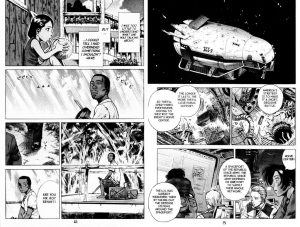Review by Frank Plowright
Why is this volume 4.2 instead of Planetes 05? Seemingly because Tokyopop split the content of one thicker concluding volume of the Japanese series over two books.
The only certainty about Planetes over the previous four books is that there’s no predicting where it goes. With only five chapters left to finish off what seemed to be a war in space kicking off at the end of Planetes 4.1, Makoto Yukimura begins instead with a look at racial prejudice in 20th century Southern USA concerning the Uncle Bobby that Fee loved as a child. He’s eccentric, to say the least, and when a young child goes missing in the neighbourhood the fingers point in his direction. What at first seems just to be background for Fee’s character is a clever comment on how she’s always been able to see things differently. When very young it was because she was close to her Uncle, but that same clarity applies to what she’s doing in command of the DS-12, and the results of that.
The actual war is of no interest to Yukimura, well aware that space war has been a common theme in manga and anime. While the technical attention he applies to spacecraft is phenomenal, his real interest is the sociological impact on society. With so much debris now in orbit, how will humanity progress without being able to leave the planet safely? He’s also interested in Fee’s response. Can she now return to Earth and be a housewife as she claims, or is her destiny elsewhere?
By the time Yukimara’s attention heads toward Jupiter, Hachi, for long Planetes’ principal character, hasn’t been seen for eight chapters, or eighteen months in his time. Again, it’s not the obvious aspects of a trip to Jupiter that interest Yukimara. What he details is the tedium. The crew have little to do, so how do they occupy their time? Yukimara’s intention is plain, but reading about a bored crew finding ways to entertain themselves doesn’t fascinate, and the central philosophical point of not being able to read the minds of others making life interesting doesn’t have the intended weight. For the penultimate chapter to an intriguing series, it’s disappointing, although a surprise is provided at the end.
Humanity has been at the core of Planetes, and that’s how it drifts to the end, the final chapter set after a couple more years have passed. We take a tour around all surviving major characters, each of which is having a fascinating conversation, but on very different topics. Is there redemption for Werner Locksmith? Where is Fee truly at home? What defines love? There are no definitive answers to many questions. Personal interpretation is all, and anyone expecting anything other than the philosophical from Yukimara as Planetes ends hasn’t been paying attention. It’s a thoughtful and warming finish.
As a complete series Planetes is a constant joy provided you accept Yukimara’s lead rather than expecting he’ll conform to what readers may want to see and always provide an answer. There is no bombast. It tackles big ideas, but always from the perspective of ordinary people, Locksmith’s involvement notwithstanding. At times it entrances, and very occasionally, as with the penultimate chapter, it may disappoint, personal visions coming with downs as well as ups, but the balance is heavily in the credit column for a series of stories that linger.
These chapters are now more easily found in the second Planetes Omnibus.





